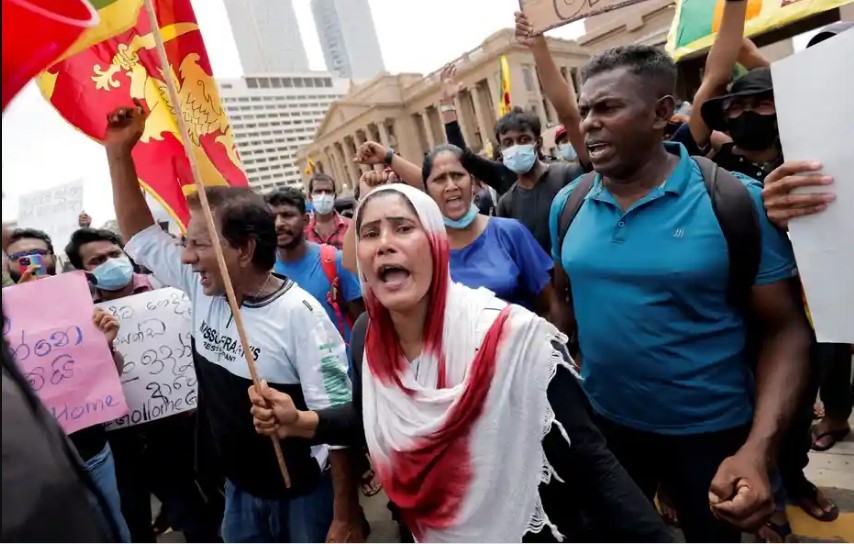Monday, June 20, 2022 would go down as Sri Lankan President Gotabaya Rajapaksa’s unhappiest birthday.
As he turned 73, the “Gota Go Home” campaign, which had been going on for more than two months, intensified, with slogan-shouting crowds barricading all the three entrances to his palatial office in Colombo.
University students are up in arms again. The Inter-University Students Movement held a demonstration in Colombo, demanding Gotabaya’s resignation. The police made 19 arrests.
In the past few days, irate motorists and three-wheeler drivers had been fighting pitched battles with the police at a number of places in the island. They were sick of being in serpentine queues at fuel filling stations and cooking gas outlets for five to 12 hours, sometimes even more than that. The lucky few got fuel after a grueling wait, but the majority returned home disappointed and seething with anger.
Standing in queues, often on an empty stomach, about ten persons have died, reports said. One was a 53-year-old three-wheeler driver at a filling station in Wekada in Panadura, south of Colombo, who had been in the queue for a whole day. Others in the queue could not rush him to the hospital because an ambulance could not obtained. The vehicle had no fuel.
Skyrocketing prices of essential food items, triggered by shortages, have led to the poorer classes cutting down on food. According to the World Food Program (WFP), at least 22% of the country’s 22 million people are facing a “food crisis”, if not starvation. A shortage of life saving drugs has led to surgeons postponing cardiac surgeries.
Schools in Colombo and other cities have been closed for a week because of the lack of fuel to run buses and three-wheelers. Government servants, barring those in the essential services, have been asked to work from home for two weeks. Plans are afoot to ration fuel giving priority to buses and trucks, and to supply these at designated government-run fuel depots.
The Sri Lanka Private Bus Owners’ Association President Gemunu Wijeratne is quoted as saying that the private buses would need 600,000 litres of diesel per day and that too to meet only 50% of the demand. But the money for all this is hard to come by. Sri Lanka needs US$ 530 million for fuel imports in June. At the end of May, it appealed to India for a further US$ 500 million loan to buy fuel.
Meanwhile fuel prices have gone the roof. Diesel, earlier sold for LKR 289 (US$ 0.80) per litre, now costs LKR 400, a 38 % jump. Petrol prices rose from LKR 338 to LKR 420. The fuel/transport price hike is reflected in the rise in the prices of everything in the market.
Sri Lanka is severely short of foreign exchange. In May, its forex reserves stood at just US$ 1.9 billion, clearly insufficient to meet the needs of a highly import-dependent economy. China has said that it will release US$ 1.5 billion only if Sri Lanka has forex for three months’ imports, a condition Sri Lanka cannot meet.
India is the only country helping Sri Lanka substantially. Others have pitched in with much less. India has so far given loans totaling US$ 3.5 billion for fuel, food, fertilizer and medicines. Tamil Nadu State itself has given essentials worth US$ 16 million. Bangladesh entered into a SWAP arrangement for US$ 200 million. Japan has given US$ 1.5 billion for food through the World Food Program. World Bank has announced assistance of US$ 600 million to facilitate essential imports.
Wealthy China and the West are sitting on the fence waiting for the IMF’s recommendations for Sri Lanka. They are not eager to lend to bankrupt Sri Lanka which defaulted on repayment to the tune of US$ 26 billion in April.
Thus far, Chinese aid has totaled a mere US$ 76 million. China has serious differences with Sri Lanka on how the latter should tackle the crisis. When the Chinese Foreign Minister Wang Yi came to Sri Lanka in January 2022, he told President Gotabaya that Sri Lanka must be financially prudent, make use of the infrastructure created by China, promote Chinese and foreign investment rather than take loans. The Sino-Lankan Free Trade Agreement must be signed.
China has so far refused to restructure the repayment of the loans it had given and has offered refinancing instead. China also wants Lanka to abandon India and the West and come into its fold.
An IMF team is currently in Colombo. If Sri Lanka agrees to implement the IMF’s proposals for reform, Western countries and Japan are likely to step up aid. The Chinese stand may also change for the better as the IMF’s recommendations will help tone up the sluggish Lankan economy.
END





